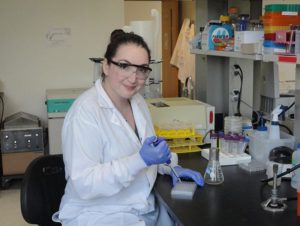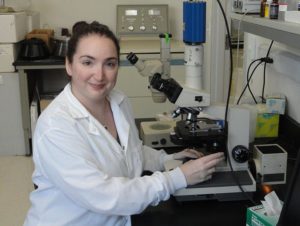 Nicole Thunes is a Ph.D. student studying microbiology. She studies the bacterium Flavobacterium columnare, which causes disease in wild and aquaculture-reared fish. Fish are an important component of our diet, and an excellent source of protein. Harvest of wild fish cannot meet the current and future demand and sustainable aquaculture is needed to fill this need. F. columnare is a major problem for sustainable aquaculture.
Nicole Thunes is a Ph.D. student studying microbiology. She studies the bacterium Flavobacterium columnare, which causes disease in wild and aquaculture-reared fish. Fish are an important component of our diet, and an excellent source of protein. Harvest of wild fish cannot meet the current and future demand and sustainable aquaculture is needed to fill this need. F. columnare is a major problem for sustainable aquaculture.
Nicole is helping to identify how F. columnare causes disease. She identifies bacterial genes that are predicted to be important in the disease process, constructs mutations in these, and examines the mutants for defects in virulence. Some of her mutants fail to cause disease and are thus potential vaccines to protect aquaculture fish. Some of the genes that she studies are involved in an unusual type of bacterial movement (gliding motility) and others are linked to a newly discovered protein secretion system. Nicole is examining the roles of both of these processes in the ability to cause disease. Her research has broad significance. As Nicole indicates “F. columnare only causes disease in fish, but related bacteria cause disease in other animals and in humans. Thus, what I learn about F. columnare may be relevant for diseases of people”.
 Through her research Nicole has developed skills in microbiology, molecular biology, genetics, genomics, microscopy, and animal handling. These skills prepare her for a wide variety of possible career paths. Nicole plans to continue in the area of molecular microbiology and hopes to find a research position studying pathogenic bacteria. When not in lab, Nicole enjoys reading, knitting, and spending time with her hairless cats.
Through her research Nicole has developed skills in microbiology, molecular biology, genetics, genomics, microscopy, and animal handling. These skills prepare her for a wide variety of possible career paths. Nicole plans to continue in the area of molecular microbiology and hopes to find a research position studying pathogenic bacteria. When not in lab, Nicole enjoys reading, knitting, and spending time with her hairless cats.